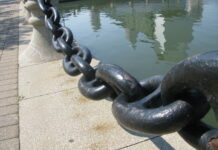Photo credit: DiasporaEngager (www.DiasporaEngager.com).
Though significant, connections between Palestinian Arab statehood and nuclear war remain generally ignored. For Israel, the seemingly discrete perils of war with Iran and Palestinian Arab statehood are potentially intertwined and mutually reinforcing. This means that continuing to treat these issues as separate security problems could represent an especially grievous policy error.
There are variously clarifying particulars. Once established, a Palestinian state could tilt the balance of power between Israel and Iran. For the moment, there is no law-based Palestinian state (i.e., no Palestinian Arab satisfaction of authoritative requirements delineated at the Montevideo Convention of 1934). But if there should sometime come a point where Palestinian statehood and a direct war with Iran would coincide, the effects could prove determinative. In a worst case scenario, the acceleration of competitive risk-taking in the region would enlarge the risks of unconventional warfare.
For the moment, any direct war between Israel and Iran would be fought without any “Palestine variable.” Ironically, however, one more-or-less plausible outcome of such a war would be more pressure on Israel to accept yet another enemy state. To be sure, Iran’s leaders are unconcerned about Palestinian Arab well-being per se, but even a continuously faux commitment to Palestinian statehood would strengthen their overall power position.
Additionally, any formal creation of “Palestine” would be viewed in Tehran as a favorable development regarding wars fought against Israel. While nothing scientifically meaningful can be said about an unprecedented scenario (in logic and mathematics, true probabilities must always be based upon the determinable frequency of pertinent past events), there are persuasive reasons to expect that “Palestine” would become a reliably belligerent proxy of Iran.
A “Two-State Solution” would enlarge not “only” the jihadist terror threat to Israel (conventional and unconventional), but also prospects for major regional war. Even if such a war were fought while Iran was still pre-nuclear, it could still use radiation dispersal weapons or electromagnetic pulse weapons (EMP) against Israel and/or target the Dimona nuclear reactor with conventional rockets. In a worst case scenario, Iran’s already nuclear North Korean ally would act in direct belligerency against the Jewish State.
In these complex strategic assessments, Israeli-Palestinian negotiations ought never be confined to “general principles.” Rather, variously specific issues will need to be addressed head-on: borders; Jerusalem; relations between Gaza and the “West Bank;” the Cairo Declaration of June 1974 (an annihilationist “phased plan”); and the Arab “right of return” and cancellation of the “Palestine National Charter” (which still calls unambiguously and unapologetically for the eradication of Israel “in stages”).
Not to be overlooked by any means, any justice-based plan would need to acknowledge the historical and legal rights of the Jewish people in Judea and Samaria. Such an acknowledgment would represent an indispensable corrective to lawless Hamas claims of “resistance by any means necessary” and to genocidal Palestinian calls for “liberating” all territories “from the river to the sea.” On its face, the unhidden Palestinian Arab expectation is that Israel would become part of “Palestine.” But this ought not to come as any surprise. All Islamist/Jihadist populations already regard Israel as “occupied Palestine.”
“Everything is very simple in war,” warns classical Prussian strategist Carl von Clausewitz in On War, “but the simplest thing is still very difficult.” American presidents have always insisted that regional peace be predicated on Arab recognition of the Jewish people’s right to security in their own sovereign nation- state.
Concurrently, most Arab leaders in the Middle East secretly hope for a decisive Israeli victory over Hamas in Gaza and over Hezbollah in Lebanon.
What about North Korea and future Middle Eastern war? Pyongyang has a documented history of active support for Iran and Syria. Regarding ties with Damascus, it was Kim Jung Un who built the Al Kibar nuclear reactor for the Syrians at Deir al-Zor. This is the same facility that was preemptively destroyed by Israel in its “Operation Orchard” (also known in certain Israeli circles as “Operation Outside the Box”) on September 6, 2007.
For Israel, nuclear weapons, doctrine and strategy will remain essential to national survival. In this connection, the country’s traditional policy of “deliberate nuclear ambiguity” or “bomb in the basement” should promptly be updated. The key objective of such dramatic changes would be more credible Israeli nuclear deterrence, a goal that will correlate closely with “selective nuclear disclosure.” Despite being counter-intuitive, Iran will need to become convinced that Israel’s nuclear arms are not too destructive for purposeful operational use. Here, in an arguably supreme irony, the credibility of Israel’s nuclear deterrent could vary inversely with its presumed destructiveness.
For Israeli nuclear deterrence to work longer-term, Iran will need to be told more rather than less about Israel’s nuclear targeting doctrine and about the invulnerability of Israel’s nuclear forces/infrastructures. In concert with such changes, Jerusalem will also need to clarify its still opaque “Samson Option.” The point of such clarifications would not be to suggest Israel’s willingness to “die with the Philistines,” but to enhance the “high destruction” pole of its nuclear deterrence continuum.
If the next US president maintains America’s support of Palestinian statehood, Iran will more likely consider certain direct conflict options vis-à-vis Israel. At some point in these considerations, Israel could need to direct explicit nuclear threats (counter-value and/or counter-force) toward the Islamic Republic. As policy, this posture could represent a “point of no return.”
For Israel, the unprecedented risks of Palestinian statehood could prove irreversible and irremediable. These risks would likely be enlarged if they had to be faced concurrent with an Israel-Iran war. It follows that Jerusalem’s core security obligation should be to keep Iran non–nuclear and to simultaneously prevent Palestinian statehood. From the standpoint of authoritative international law, meeting this two-part obligation would be in the combined interests of counter-terrorism, nuclear war-avoidance and genocide prevention. Prime facie, meeting this overriding obligation would be in the interests of regional and global justice.
Louis René Beres was educated at Princeton (Ph.D., 1971) and is the author of many books, monographs, and scholarly articles dealing with military nuclear strategy. In Israel, he was Chair of Project Daniel. Over recent years, he has published on nuclear warfare issues in Harvard National Security Journal (Harvard Law School); Bulletin of the Atomic Scientists; International Journal of Intelligence and Counterintelligence; Israel Journal of Foreign Affairs; The Atlantic; Israel Defense; Jewish Website; The New York Times; Israel National News; The Jerusalem Post; The Hill and other sites. A version of this article appeared in Israel National News.
Source of original article: Louis René Beres / Opinion – Algemeiner.com (www.algemeiner.com).
The content of this article does not necessarily reflect the views or opinion of Global Diaspora News (www.GlobalDiasporaNews.com).
To submit your press release: (https://www.GlobalDiasporaNews.com/pr).
To advertise on Global Diaspora News: (www.GlobalDiasporaNews.com/ads).
Sign up to Global Diaspora News newsletter (https://www.GlobalDiasporaNews.com/newsletter/) to start receiving updates and opportunities directly in your email inbox for free.




























